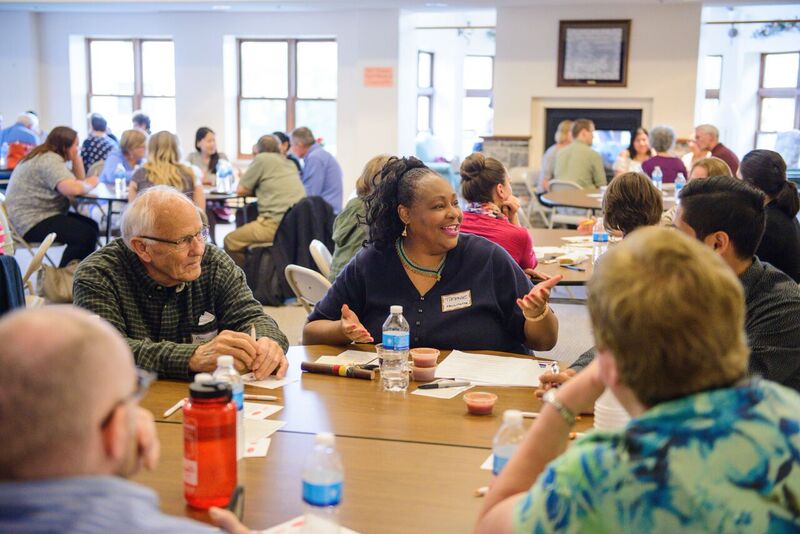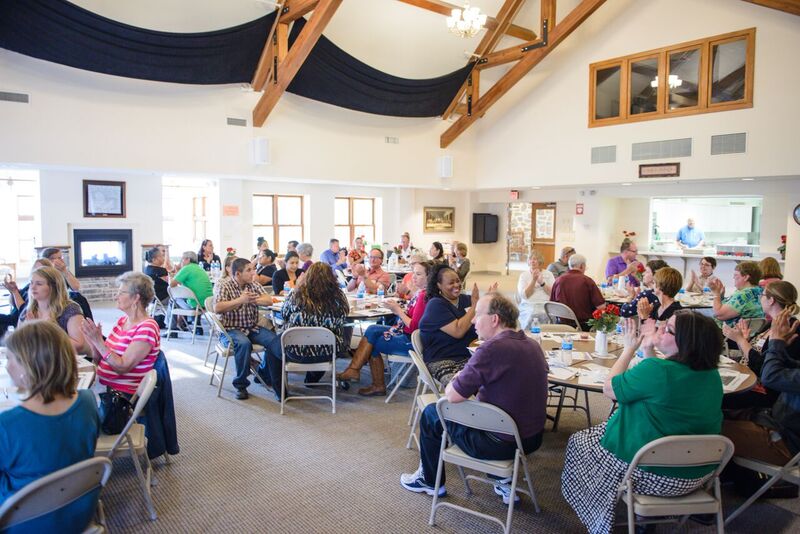 Image: Blog hero Plant Plate 09 boys dig in
Image: Blog hero Plant Plate 09 boys dig in
It’s Time to Talk

by Blandin Foundation Posted in Vibrant Rural
Forums on Race Spark Conversations that Matter to the Future of Rural Minnesota
Rural Minnesota communities are facing changes and pressures today that test long-held assumptions and challenge local leaders to forge new relationships. In fact, between 2010 and 2015, Minnesota has added four times as many people of color as white residents, according to the Minnesota State Demographic Center.
Southern Minnesota’s foreign-born population has almost doubled in the last 10 years, according to Minnesota Compass.
The time is ripe for conversations that bring communities together to bridge differences and inspire leaders to work toward communities that work for all.
That’s exactly what communities in Southern Minnesota are doing.
“It’s Time to Talk: Forums on Race” are a series of community conversations hosted by Region Nine Development Commission. In partnership with the Mankato YWCA* and its trademarked model, the forums guide conversations about race relations. Forums have been held in seven rural communities in South Central Minnesota including St. James, Waseca, St. Peter, New Ulm, Fairmont, Lake Crystal, and Montgomery.
Not a one-size-fits-all approach
With the understanding that communities are experiencing demographic shifts in very different ways, the forums are designed to fit the unique needs of each community. Each table conversation begins with introductions and shifts to community-specific topics that build awareness and empathy around racial differences. Topics have included:
- Immigration
- School disparities
- Police
- Power dynamics
- Cultural customs, values and identities
- Labor shortages
To identify relevant topics, project facilitators start by contacting community education directors and work closely with them to pull together a team that represents the diverse networks of people living the community.
These community champions work with Region Nine and the Greater Mankato Diversity Council, an organization that exists to enhance the Mankato area’s commitment to creating an inclusive and welcoming community through diversity education, to review the community landscape, adapt the Forum to the community’s culture and identify stakeholders to invite. Hailing from local school districts, businesses, local government, faith and cultural communities, local media and the chamber of commerce, community champions cast a wide net, reaching out to personal and professional networks.
“Strong engagement from the community education department of each school district has been a clear catalyst for success,” said Jessica O’Brien, community engagement manager for Region Nine. “They have brought enthusiasm and strong local connections to the project, and the community champion cohorts have served as a grassroots link to help get people to the forums.”
Once at the forum, attendees gather at a table and participate in a discussion led by trained facilitators. The conversation centers on five to seven questions designed to encourage introspection and sharing of thoughts and personal experiences.
“Allowing communities to own their own conversation is essential for wanting to continue engaging with one another after the Forum,” said Waseca resident and table host Audra Boyer. “The experience is well-crafted. We know about the community, what they want explore, what pitfalls to avoid or work through, and the opportunities for growth.”
Community history plays a significant role in how the conversation is shaped, said Sue Harris, St James’ community education director.
“Without prior community work, I don’t think the “It’s Time to Talk Forums” would have been successful in St. James,” she said. “It was the right time, right place and with the right mix of people.”
“The conversation has to be local, immediate and believed by me,” said Boyer. “If you set up the event in a way that people are not ready to hear, then you break down conversation, which is the whole purpose of the event in the first place.”
Even with the best preparation and consideration for who is in the room, the conversations can still be uncomfortable, says Julio Zalaya, St. James resident and volunteer coordinator for the forum.
“This process can feel awkward and somewhat painful,” he said. “It might be not the conversation people want to have. It’s not going to be the answer for everything, but with it has come an intentional space for people to work together, and work on themselves, for a better community.”
Hope for their community’s future drives attendance, said O’Brien.
“What I have experienced at the forums is people coming together because they are deeply invested in the future of their community and want to be part of a solution,” said O’Brien. “The forums provide a unique opportunity for stakeholders to gather together to listen, share and reflect about themselves as individuals and as a whole community.”

Carrying the conversations into the community
The forums are catalyzing further community action. St. James held their first-ever Multicultural Fiesta on the day Latin American countries celebrate their independence from Spain. Another St. James group is working on authentically listening to stories from diverse community members, while another is coming together to understand and share cultural food.
“There’s enough people ready to embrace change,” said Harris. “Together we’re building a voice, and giving others voice, to make change.”
“I am proud that our organization is leading the way in bringing these forums throughout the region,” said Nicole Griensewic Mickelson, Executive Director of Region Nine Development Commission. “Region Nine commissioners realized the need for our region to be more open and accepting of others as our demographics continue to change. If we continue to work on supporting others with different backgrounds and ethnicities, it will only strengthen our communities and ensure a vibrant and resilient future for our region.”
Learn more about the It’s Time to Talk: Forums on Race curriculum on Region Nine’s website http://www.rndc.org/what-we-do/equity-inclusion/. More about Blandin Foundation’s grant supporting the forums can be found at: https://blandinfoundation.org/partner-directory/partners/?keyword=Region%20Nine&search=1&list=1
* Adapted from the Minneapolis YWCA curriculum.